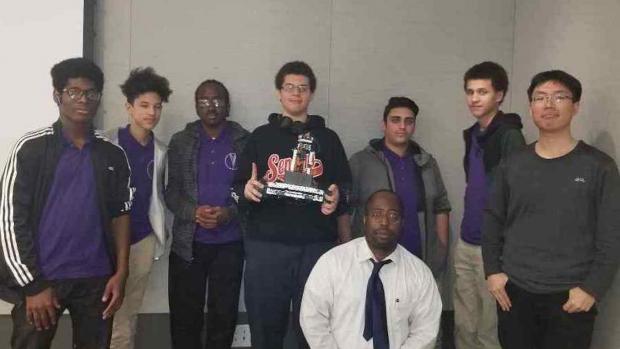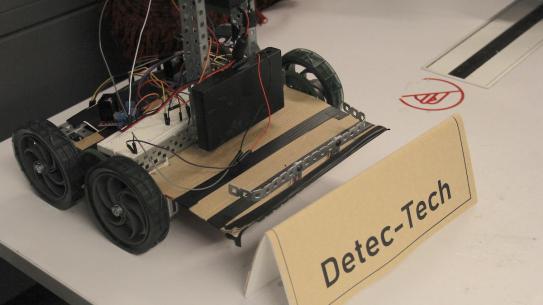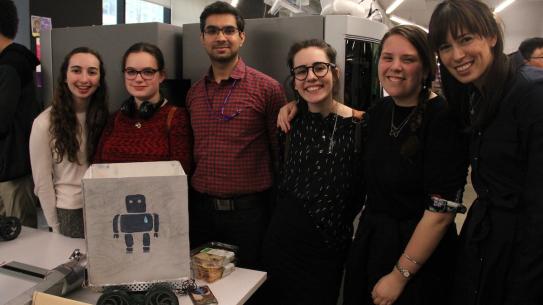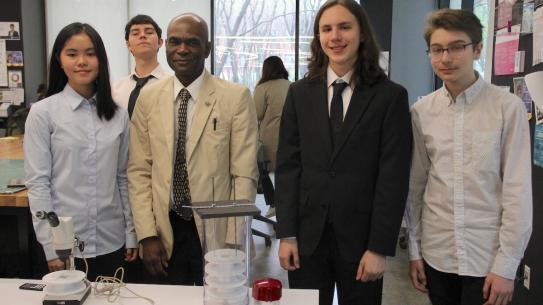InnoVention starts early
High school entrepreneurs vie for honors and internships

The first place winning team from Validus Preparatory Academy
Ask any high school student what problems crop up during a typical day, and you’re sure to hear a long list. If those students have been immersed in science, technology, engineering, and math (STEM) learning, however, they just might come up with some cutting-edge solutions to those problems.
Consider the participants in the second annual ITEST InnoVention competition at NYU Tandon. Competitors were tasked with identifying a problem and then designing and building a prototype robot to address it. From collecting the recyclable paper that seems to proliferate in every classroom to discouraging noisy crowds from congregating in the hallways, students from a variety of area schools put their minds — and their Arduinos — on finding a robotic solution.
ITEST (Innovation Technology Experiences for Students and Teachers), a National Science Foundation-funded initiative that aims to introduce the city’s high school students and their teachers to the real-world applications of robotics, is overseen by Vikram Kapila, Professor of Mechanical and Aerospace Engineering, and Dr. Sheila Borges Rajguru, Assistant Director of the Center for K12 STEM Education at NYU Tandon, with the support of Center for K12 STEM Education Director Ben Esner; Tandon professors Magued Iskander, Jin Montclare, Oded Nov, and Maurizio Porfiri; and Professor Catherine Milne of NYU Steinhardt. The program kicked off two years ago when 16 teachers and 32 students from schools throughout the five boroughs — most in underserved neighborhoods with diverse student bodies — participated in a month-long intensive workshop to learn how to incorporate robots into their STEM curricula. (An entrepreneurship component was also integrated, so that students could learn to calculate the unit cost of manufacturing their prototypes on a larger scale, pitch their ideas, and market their projects — important skills in an ever-evolving tech landscape.)
Participants returned to their schools in the fall equipped to launch robotics courses; they did so with the support of NYU Tandon graduate students who made regular visits to their classrooms and who also greatly benefited from the exercise. "The ITEST program definitely helped me improve my teaching skills,” ITEST lead instructor Abhidipta Mallik said. “Some participants were working with robots for the first time while others had prior experience, so the heterogeneous nature of the classroom in terms of technical skills, age, and demographics enabled me to be better at classroom management."
We’re pleased to give the city’s high school students the chance to delve into robotics this intensely, as some might not otherwise explore what is inarguably a growing and fascinating field. What they accomplish in less than a year is nothing short of remarkable.”
— Sheila Borges Rajguru, Assistant Director of the Center for K12 STEM Education
Those accomplishments were on full display at the recent ITEST InnoVention Competition, where participants pitched and demonstrated their robots to a team of judges that included Mina Salib, program manager at NYU Tandon’s Future Labs; Filippo Alimonda, the CTO of VirtualApt Corp; Clayton Banks, the CEO of Silicon Harlem; and Dr. Elizabeth Waters, the Associate Director STEM Outreach at Cooper Union.
“Hearing about the students’ desire to make the world better for themselves and their communities was really inspirational,” Waters said. “Seeing what they designed and built — both robotics and business plans — makes me believe they have the energy and skills to change the world!”
Banks concurs — and intends to harness those skills and energy at Silicon Harlem, a social venture that has been designed to transform Harlem into a technology and innovation hub: the winners of the competition were offered summer internships at his company. “They’ll work on several projects, including the development of a new drone piloting curriculum, and they’ll be involved in our 135 Connect initiative, which is advancing technology along 135th street,” Banks explained. “Silicon Harlem is happy to partner with Tandon’s Center for K12 STEM Education, given our shared mission of empowering communities and preparing a 21st-century workforce.”
Banks and his fellow judges were given a strict rubric to follow, and they admitted they had their work cut out for them; at the end, they chose three clear winners:
-
First-place victor Detec-Tech, created by a team from Validus Preparatory Academy (with teacher Bob Gardner), serves as a robotic hall monitor, warning disruptive students and then summoning a human administrator if the troublemakers do not disperse.
-
Water-bot, a robot that regularly delivers water to classrooms in order to keep students hydrated, was developed by a team from Midreshet Shalhevet High School (with teacher Aliza Feder) and took second place.
-
Coming in third was the Robo-sist Microscope, created by students from Brooklyn Tech (with their teacher Dr. Horace Walcott) and aimed at decreasing the risks of working with hazardous materials in high school chemistry labs.
Kapila congratulated the participants and encouraged them to continue learning. “Consider what your role can be in the tech frontier,” he advised. “Keep collaborating, communicating, and being self-directed, and you’ll be shaping the future.







